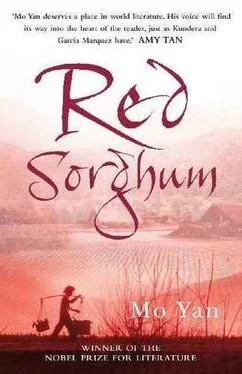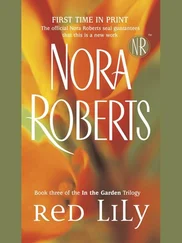The surrounding mist grew more sluggish once they were in the sorghum field. The stalks screeched in secret resentment when the men and equipment bumped against them, sending large, mournful beads of water splashing to the ground. The water was ice-cold, clear and sparkling, and deliciously refreshing. Father looked up, and a large drop fell into his mouth. As the heavy curtain of mist parted gently, he watched the heads of sorghum stalks bend slowly down. The tough, pliable leaves, weighted down by the dew, sawed at his clothes and face. A breeze set the stalks above him rustling briefly; the gurgling of the Black Water River grew louder.
Father had gone swimming so often in the Black Water River that he seemed born to it. Grandma said that the sight of the river excited him more than the sight of his own mother. At the age of five, he could dive like a duckling, his little pink asshole bobbing above the surface, his feet sticking straight up. He knew that the muddy riverbed was black and shiny, and as spongy as soft tallow, and that the banks were covered with pale-green reeds and plantain the colour of goose-down; coiling vines and stiff bone grass hugged the muddy ground, which was crisscrossed with the tracks of skittering crabs.
Autumn winds brought cool air, and wild geese flew through the sky heading south, their formation changing from a straight line one minute to a V the next. When the sorghum turned red, hordes of crabs the size of horse hooves scrambled onto the bank at night to search for food — fresh cow dung and the rotting carcasses of dead animals — among the clumps of river grass.
The sound of the river reminded Father of an autumn night during his childhood, when the foreman of our family business, Arhat Liu, named after Buddhist saints, took him crabbing on the riverbank. On that grey-purple night a golden breeze followed the course of the river. The sapphire-blue sky was deep and boundless, green-tinted stars shone brightly in the sky: the ladle of Ursa Major (signifying death), the basket of Sagittarius (representing life); Octans, the glass well, missing one of its tiles; the anxious Herd Boy (Altair), about to hang himself; the mournful Weaving Girl (Vega), about to drown herself in the river…. Uncle Arhat had been overseeing the work of the family distillery for decades, and Father scrambled to keep up with him as he would his own grandfather.
The weak light of the kerosene lamp bored a five-yard hole in the darkness. When water flowed into the halo of light, it was the cordial yellow of an overripe apricot. But cordial for only a fleeting moment, before it flowed on. In the surrounding darkness the water reflected a starry sky. Father and Uncle Arhat, rain capes over their shoulders, sat around the shaded lamp listening to the low gurgling of the river. Every so often they heard the excited screech of a fox calling to its mate in the sorghum fields beside the river. Father and Uncle Arhat sat quietly, listening with rapt respect to the whispered secrets of the land, as the smell of stinking river mud drifted over on the wind. Hordes of crabs attracted by the light skittered towards the lamp, where they formed a shifting, restless cloister. Father was so eager he nearly sprang to his feet, but Uncle Arhat held him by the shoulders.
‘Take it easy! Greedy eaters never get the hot gruel.’ Holding his excitement in check, Father sat still. The crabs stopped as soon as they entered the ring of lamplight, and lined up head to tail, blotting out the ground. A greenish glint issued from their shells, as countless pairs of button eyes popped from deep sockets on little stems. Mouths hidden beneath sloping faces released frothy strings of brazenly colourful bubbles. The long fibres on Father’s straw rain cape stood up. ‘Now!’ Uncle Arhat shouted. Father sprang into action before the shout died out, snatching two corners of the tightly woven net they’d spread on the ground beforehand; they raised it in the air, scooping up a layer of crabs and revealing a clear spot of riverbank beneath them. Quickly tying the ends together and tossing the net to one side, they rushed back and lifted up another piece of netting with the same speed and skill. The heavy bundles seemed to hold hundreds, even thousands of crabs.
As Father followed the troops into the sorghum field, he moved sideways, crablike, overshooting the spaces between the stalks and bumping them hard, which caused them to sway and bend violently. Still gripping tightly to Commander Yu’s coat-tail, he was pulled along, his feet barely touching the ground. But he was getting sleepy. His neck felt stiff, his eyes were growing dull and listless, and his only thought was that as long as he could tag along behind Uncle Arhat to the Black Water River he’d never come back empty-handed.
Father ate crab until he was sick of it, and so did Grandma. But even though they lost their appetite for it, they couldn’t bear to throw the uneaten ones away. So Uncle Arhat minced the leftovers and ground them under the bean-curd millstone, then salted the crab paste, which they ate daily, until it finally went bad and became mulch for the poppies.
Apparently Grandma was an opium smoker, but wasn’t addicted, which was why she had the complexion of a peach, a sunny disposition, and a clear mind. The crab-nourished poppies grew huge and fleshy, a mixture of pinks, reds, and whites that assailed your nostrils with their fragrance. The black soil of my hometown, always fertile, was especially productive, and the people who tilled it were especially decent, strong-willed, and ambitious. The white eels of the Black Water River, like plump sausages with tapered ends, foolishly swallowed every hook in sight.
Uncle Arhat had died the year before on the Jiao-Ping highway. His corpse, after being hacked to pieces, had been scattered around the area. As the skin was being stripped from his body, his flesh jumped and quivered, as if he were a huge skinned frog. Images of that corpse sent shivers up Father’s spine. Then he thought back to a night some seven or eight years earlier, when Grandma, drunk at the time, had stood in the distillery yard beside a pile of sorghum leaves, her arms around Uncle Arhat’s shoulders. ‘Uncle… don’t leave,’ she pleaded. ‘If not for the sake of the monk, stay for the Buddha. If not for the sake of the fish, stay for the water. If not for my sake, stay for little Douguan. You can have me, if you want…. You’re like my own father….’ Father watched him push her away and swagger into the shed to mix fodder for the two large black mules who, when we opened our distillery, made us the richest family in the village. Uncle Arhat didn’t leave after all. Instead he became our foreman, right up to the day the Japanese confiscated our mules to work on the Jiao-Ping highway.
Now Father and the others could hear long-drawn-out brays from the mules they had left behind in the village. Wide-eyed with excitement, he could see nothing but the congealed yet nearly transparent mist that surrounded him. Erect stalks of sorghum formed dense barriers behind a wall of vapour. Each barrier led to another, seemingly endless. He had no idea how long they’d been in the field, for his mind was focused on the fertile river roaring in the distance, and on his memories. He wondered why they were in such a hurry to squeeze through this packed, dreamy ocean of sorghum. Suddenly he lost his bearings. He listened carefully for a sign from the river, and quickly determined that they were heading east-southeast, towards the river. Once he had a fix on their direction, he understood that they would be setting an ambush for the Japanese, that they would be killing people, just as they had killed the dogs. By heading east-southeast, they would soon reach the Jiao-Ping highway, which cut through the swampy lowland from north to south and linked the two counties of Jiao and Pingdu. Japanese and their running dogs, Chinese collaborators, had built the highway with the forced labour of local conscripts.
Читать дальше












